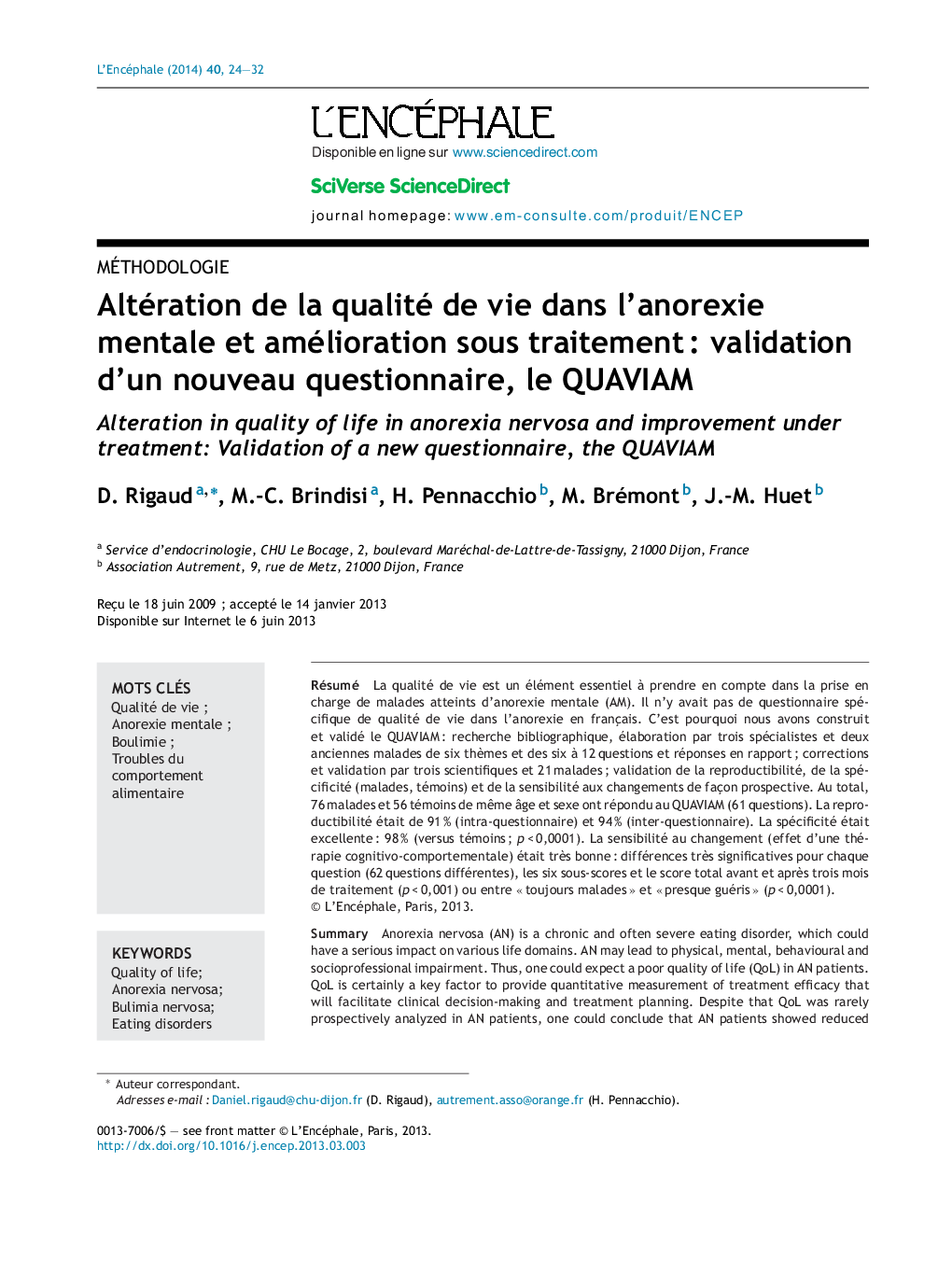| کد مقاله | کد نشریه | سال انتشار | مقاله انگلیسی | نسخه تمام متن |
|---|---|---|---|---|
| 4181725 | 1277139 | 2014 | 9 صفحه PDF | دانلود رایگان |
عنوان انگلیسی مقاله ISI
Altération de la qualité de vie dans l'anorexie mentale et amélioration sous traitement : validation d'un nouveau questionnaire, le QUAVIAM
دانلود مقاله + سفارش ترجمه
دانلود مقاله ISI انگلیسی
رایگان برای ایرانیان
کلمات کلیدی
موضوعات مرتبط
علوم پزشکی و سلامت
پزشکی و دندانپزشکی
روانپزشکی و بهداشت روانی
پیش نمایش صفحه اول مقاله

چکیده انگلیسی
Anorexia nervosa (AN) is a chronic and often severe eating disorder, which could have a serious impact on various life domains. AN may lead to physical, mental, behavioural and socioprofessional impairment. Thus, one could expect a poor quality of life (QoL) in AN patients. QoL is certainly a key factor to provide quantitative measurement of treatment efficacy that will facilitate clinical decision-making and treatment planning. Despite that QoL was rarely prospectively analyzed in AN patients, one could conclude that AN patients showed reduced QoL, as compared to normal controls and other psychiatric-disordered patients. It seems that mental health components of QoL are more impaired than the physical ones in AN patients, who showed a modest impact in the physical domain. Thus, our aim was to analyse the QoL using a new, French, questionnaire, the QUAVIAM (qualité de vie dans l'anorexie mentale). After a bibliography research (including EDE, EDI, SF-36, QOL.ED), the choice of 12 themes, regrouped in six scores, was made by three eating disorder specialists and two recovered patients. For each score, 10 to 15 questions were written by the experts, and then corrections and validation were made by the five experts and 21 patients. After this, we prospectively determined the reproducibility (3 days interval), the specificity, and the sensitivity for short-term change in patients exhibiting an “active” AN (n = 54, mean age: 31 ± 9 yrs, mean BMI: 14.1 ± 2.8 kg/m2, AN duration: 2.6 ± 1.9 yrs), and again after cognitive behavioral therapy (CBT). We also analyzed the QUAVIAM score and subscores in 48 recovering patients and in 56 subjects without eating disorder. The QUAVIAM final version (61 questions) was collected in 76 patients and the 56 healthy controls matched for sex and age. Its reproducibility was 91% (intra-questionnaire) and 94% (inter-questionnaire), its specificity 98% (versus controls; P < 0.0001) and its sensitivity 99%. The QUAVIAM global score of the AN patients was more impaired (389 ± 87) than that of the recovering patients (157 ± 82) and the normal controls (89 ± 49; P < 0.0001). Each of the six subscores was higher (more altered) in active AN than in recovering AN patients and in normal subjects: the somatic, the psychological, the hedonic, the socioprofessional, the affective and the TCA-related ones (P < 0.001 for each comparison). The QUAVIAM global score and its subscores were significantly improved (decreased) by the 3-month CBT: 385 ± 25 before and 189 ± 30 after CBT (P < 0.0001). The changes were observed for all the subscales (P < 0.0001). The somatic subscore did not decrease less than the other subscores. Thus, the present study permits proposing the QUAVIAM for analysis of physical, mental, behavioural and socioprofessional impairment or improvements in AN patients.
ناشر
Database: Elsevier - ScienceDirect (ساینس دایرکت)
Journal: L'Encéphale - Volume 40, Issue 1, February 2014, Pages 24-32
Journal: L'Encéphale - Volume 40, Issue 1, February 2014, Pages 24-32
نویسندگان
D. Rigaud, M.-C. Brindisi, H. Pennacchio, M. Brémont, J.-M. Huet,